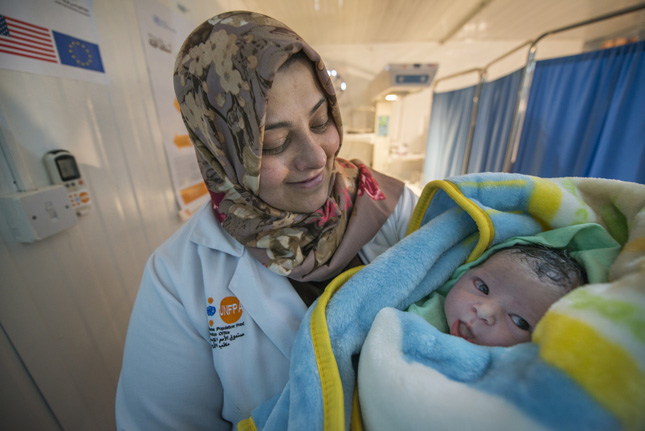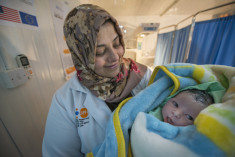-
Too Little Too Late: Violence Disrupts Maternal Health Care in Conflict Settings
August 27, 2018 By Yuval Cohen “One of the first victims of war is the health care system itself,” said Marco Baldan, the chief war surgeon for the International Committee of the Red Cross. Violence directed at health facilities and workers is common in conflict, despite international laws protecting medical personnel, facilities, and transport vehicles during war.
“One of the first victims of war is the health care system itself,” said Marco Baldan, the chief war surgeon for the International Committee of the Red Cross. Violence directed at health facilities and workers is common in conflict, despite international laws protecting medical personnel, facilities, and transport vehicles during war.
No Rules: Violence Targeting Health Facilities
“One of the first victims of war is the health care system itself,” said Marco Baldan, the chief war surgeon for the International Committee of the Red Cross. Violence directed at health facilities and workers is common in conflict, despite international laws protecting medical personnel, facilities, and transport vehicles during war.
“One of the first victims of war is the health care system itself”
By the end of 2016, almost half of Yemen’s health facilities were not fully functioning and more than 270 health facilities had been destroyed or damaged in conflict. “On top of this, drastic budget cuts have left health facilities without funds for operational costs and health care workers without regular salaries since September 2016,” the UN reported.
At Yemen’s Al-Thawra Hospital, unpaid staff serve approximately 1,500 people a day. Khaled Suhail, the hospital’s director, told the UN that “with no funds for operational costs, we never know if we will still be open one month from now.” A continuous influx of displaced people threatens to overwhelm the already struggling health system.
Similarly, only half of Syria’s health facilities are fully functional. In February 2018 alone, “violent incidents disrupted 15,000 medical consultations and nearly 1,500 surgeries, many life-saving,” reported the Voice of America.
The disruption is especially problematic for women needing emergency obstetric care. “Like in other armed conflict settings, women in Syria are suffering from gender-based violence and a lack of access to high quality health care—particularly during pregnancy and delivery,” according to an article published by Harvard University’s Maternal Health Task Force (MHTF).
Syrian women in refugee camps also have limited access to health facilities. The Al-Areesheh refugee camp, established in 2017 and home to more than 3,500 displaced Syrians, has no standing health facilities.
“Pregnant women do not have reliable access to antenatal care, and new mothers lack regular post-partum services and newborn care,” UNFPA reported. “UNFPA and WHO are supporting two mobile teams, which are providing a variety of health services in the camp, including reproductive health care.”
Conflict Affects Health Workers, Too
The lack of health facilities in conflict settings is compounded by a lack of health professionals. “Health workers may be killed, injured, too distressed to work, displaced, or they may have fled,” states UNFPA’s State of the World Population 2015.
“At the core of…humanitarian action, from response to resilience and development, are sexual and reproductive health and rights”
An evaluation of maternal health during the 2006 war in Lebanon, for example, found that few health professionals in conflict-affected areas were able to provide emergency services for the displaced population: “Primary health care personnel and health care providers were also among those who were displaced. Very few remained working on emergency surgeries and in deployed field hospitals.”
“In conflict-affected settings, women have reduced access to both skilled birth attendants and emergency obstetric and neonatal care, due to insecurity, travel restrictions, and missing or delayed staff and services,” write the authors of a 2016 article in Health Policy Planning. “Thus, community midwifery investment can increase access, improving birth and other reproductive health outcomes such as family planning, and reduces the need for possibly dangerous travel in fragile and conflict-affects states.”
“A midwife’s scope of work could meet the needs of most women in these displaced settings,” including family planning, menstrual health, domestic and sexual violence, and pregnancy, said Sera Bonds, CEO of Circle of Health International in an interview with MHTF—and midwives are also cost-effective, she added.
“At the core of…humanitarian action, from response to resilience and development, are sexual and reproductive health and rights,” states UNFPA. Understanding the barriers facing pregnant women in complex emergencies is the first step to ending needless maternal deaths—and creating a more resilient society.
Sources: Health Care for Women International, Health Policy and Planning Journal, International Committee of the Red Cross, Maternal Health Task Force, Social Science and Medicine Journal, United Nations, United Nations Office for the Coordination of Humanitarian Affairs, United Nations Population Fund, United Nations Refugee Agency, Voice of America
Photo Credit: Dr. Rima Diab, a doctor at an ECHO-funded UNFPA clinic in Jordan’s Zaatari camp, holds Omar, the latest baby to be born at the clinic. Photo credit: EU/ECHO/Peter Biro.
 A Publication of the Stimson Center.
A Publication of the Stimson Center.

 “One of the first victims of war is the health care system itself,”
“One of the first victims of war is the health care system itself,” 

